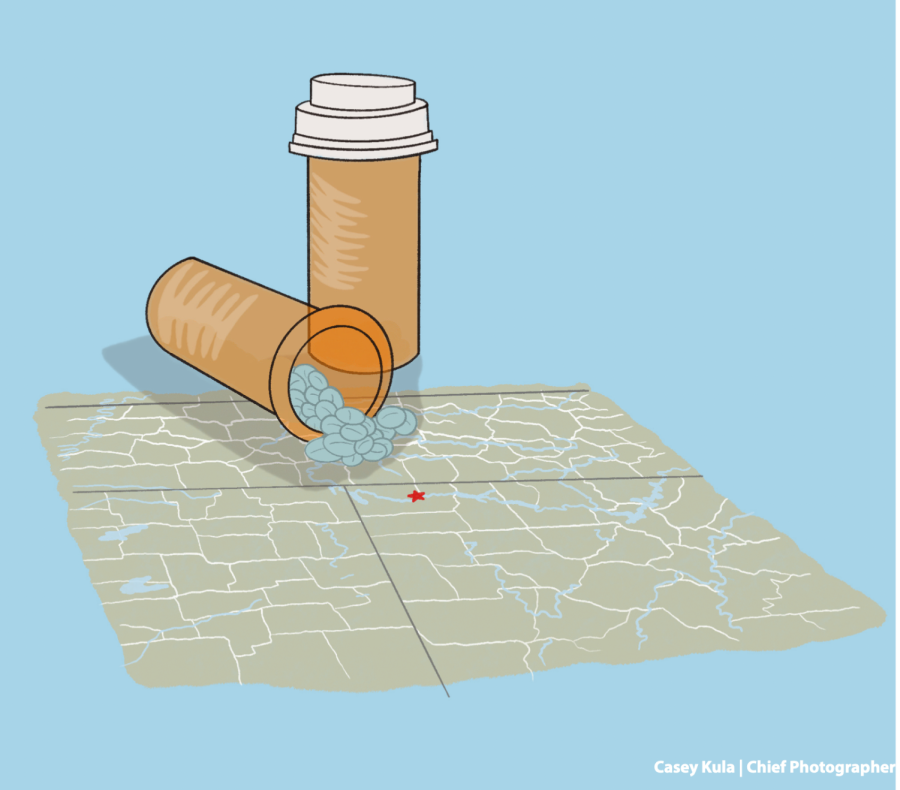Lauderdale County reports increase in fentanyl overdoses
October 20, 2022
According to the National Institute on Drug Abuse at the National Institutes of Health, fentanyl is a synthetic opioid that is comparable to morphine but is 50 to 100 times stronger. It is normally prescribed by doctors for patients in severe or chronic pain, especially when patients have become tolerant to other opioids.
Like other opioid drugs such as heroin, fentanyl binds to the body’s opioid receptors in the areas of the brain that are responsible for controlling emotions and pain. Addiction can follow if opioids are taken repeatedly and the brain’s sensitivity to opioids is lessened, making it harder to feel pleasure without the aid of drugs.
“Synthetic opioids, including fentanyl, are now the most common drugs involved in drug overdose deaths in the United States,” the NIDA said.
Chuck Hearn, investigator at the Florence Police Department and Director of the Lauderdale County Drug Task Force, has been a firsthand witness to the increase in fentanyl overdoses and the ways that the drug is being disguised.
“We have seen an increase in fentanyl overdoses,” Hearn said. “We’ve seen Fentanyl mixed with other substances, like meth and cocaine, and now we’re seeing counterfeit oxycodone pills that are actually fentanyl pills instead. All of those have increased our overdoses and overdose deaths.”
The most common way that Hearn has seen fentanyl being distributed recently is by itself or when presented as counterfeit oxycodone pills. He believes this rise in overdoses can be linked back to the sheer amount that is available.
“I know at the Lauderdale County Drug Task Force, from about April to present, we’ve seen over 17,000 fentanyl pills, and that’s just what we have been able to obtain, so we know that there has been more that has been around here,” Hearn said.
This increase in availability of fentanyl has led to a dramatic increase in the numbers of fentanyl overdoses and deaths in the state of Alabama. According to AL.com’s reporter John Sharp, Richard Tucker, a former special agent with the U.S. Drug Enforcement Agency and a consultant with the Drug Education Consulting Group, said that Fentanyl deaths in Alabama surged by 136 % between 2020 and 2021, with more deaths predicted this year.
Fentanyl has also been found in brightly colored pills that look like candy, called “rainbow fentanyl,” which is concerning for politicians, law enforcement and parents alike. The colorful drug, though not found in Alabama yet, has been seized by authorities in 18 states so far. It is thought to be marketed toward children, teens and young adults, making parents wary of the upcoming Halloween holiday.
Alabama lawmakers have been proposing solutions to deal with overdoses and deaths.
Republican politicians feel that harsher sentences should be placed on those who traffic the drug to create stronger penalties and discourage the further sale and distribution of fentanyl. In a proposal laid out by State Representatives Matt Simpson and Chris Pringle, mandatory minimum sentencing guidelines would apply to the weight of fentanyl found in the state, which could lead to one of the harshest laws against fentanyl in the nation. Under this proposal, traffickers caught with more than 8 grams of fentanyl could face a life sentence.
Democratic politicians, such as Alabama State House Minority Leader Anthony Daniels, feel that lawmakers should take more action to stop the sale of fentanyl and a more comprehensive approach should also be implemented to help those struggling with addiction. They feel that supplying aid, such as mental health treatment, to those with substance abuse disorders could help address the state’s overcrowded prison system.
To prevent overdose deaths on an individual level, those on the scene of an overdose can use the opioid blocker naloxon. It is commonly referred to as the brand name Narcan, which reverses the effects of an overdose and allows breathing rates to return to normal.
AL.com’s reporter Savannah Tryens-Fernandes found that many schools and households are now keeping naloxone for emergency situations such as a fentanyl overdose. Fentanyl testing strips, which were previously illegal in Alabama, are now provided by some county health departments to citizens who wish to test their drugs and prevent an overdose.
Investigator Hearn believes that the best way to prevent overdoses is education.
“Especially for younger, college-aged kids, there’s no experimenting with these types of drugs,” Hearn said. “One time can kill somebody, whether that’s straight fentanyl, something that’s laced with fentanyl or something that’s counterfeit and contains fentanyl. People need to know the dangers that exist from that. We’re educating as many people as we can.”




![Caleb Crumpton [COURTESY OF UNA SGA]](https://theflorala.com/wp-content/uploads/2024/07/caleb-crumpton-courtesy-of-SGA-425x600.jpg)






